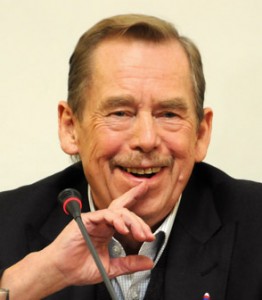By Bob Hicks
At OregonLive, Marty Hughley has just posted a terrific interview with Stepan Simek about Vaclav Havel, the philosopher-playwright who became the unlikely leader of the Czech revolution and his nation’s first post-Soviet president. Havel died on Sunday at age 75.
 Simek, a native of Prague and chairman of the theater department at Lewis & Clark College, is also the English translator of Havel’s play The Increased Difficulty of Concentration. And although he met Havel just once, he had an intriguing connection with the legendary leader. “The funny thing is that my parents and grandparents were very good friends with his parents,” Simek tells Marty. “When I was born, the Havels gave my parents this cradle — a pink, wooden painted cradle — that Havel himself was cradled in. And I was cradled in it and it still is in my family’s possession.”
Simek, a native of Prague and chairman of the theater department at Lewis & Clark College, is also the English translator of Havel’s play The Increased Difficulty of Concentration. And although he met Havel just once, he had an intriguing connection with the legendary leader. “The funny thing is that my parents and grandparents were very good friends with his parents,” Simek tells Marty. “When I was born, the Havels gave my parents this cradle — a pink, wooden painted cradle — that Havel himself was cradled in. And I was cradled in it and it still is in my family’s possession.”
The interview is wide-ranging and intellectually stimulating, exploring Havel’s influence both as an artist and as a political and moral leader. Simek isn’t dewey-eyed about Havel — he points out warts and weaknesses, even as it’s obvious he holds him in high regard — and he has intriguing things to say about the differences in European and American perceptions of things. He has particularly interesting things to say about the distinction between morality and decency, a subject that seems to get to the heart of Havel’s public and private personae.
Simek has been a stimulating addition to Portland’s theater scene, even though he spends most of his time on campus and not among the theaters at large. His European sensibility is an important one, and he’s done some fascinating work. A couple of years ago he invited me to see his student production of Romeo and Juliet at Lewis & Clark. It was a play I really thought I didn’t care if I ever saw again, but Stepan, who had never directed Shakespeare before, brought a refreshing new eye to it and left me appreciating his stagecraft, his young actors’ skills, and the play itself in ways I hadn’t before. Simek saw Romeo and Juliet as a play with only one true adult, Friar Laurence, in it: Everyone else is either childish or literally a child. That insight cracked the play open in invigorating ways. His thoughts about Havel reveal a similarly stimulating intellect at work and play. Do take the time to read the interview.
*
Meanwhile, this morning’s New York Times features a lovely interview by Melena Ryzik with the actor Christopher Plummer, still vigorous and entertaining at age 82. And prominent: He has a pair of big-deal performances in big-deal movies on screens right now, as a patriarchal baddie in David Fincher’s new version of Girl With the Dragon Tattoo and, in writer-director Mike Mills’ Beginners, as an aged father who belatedly but emphatically comes out of the closet. Plummer is getting lots of Oscar play for the latter role.
A couple of highlights from the interview:
- John Huston’s advice to Plummer, a superb classical stage actor, during filming of The Man Who Would Be King: “Chris, just take the music out of your voice.”
- An insight from a mentor, Michael Langham, at Ontario’s Stratford Shakespeare Festival, “who advised him to play Hamlet with a sense of scholarly wonder. ‘So you put the words, “Isn’t it extraordinary?” in front of everything,’ Mr. Plummer said. Then something brooding like, ‘the rest is silence’ — Hamlet’s last words — becomes a discovery.”
*
Vaclav Havel in Prague, Nov. 14, 2009. Photo: Ondrej Siama/Wikimedia Commons